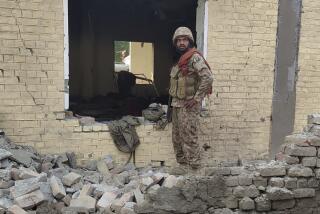Second suicide attack kills 37 in Afghanistan
KABUL, AFGHANISTAN — In the second major attack in two days, at least 37 people were killed Monday when a suicide bomber rammed his vehicle into a Canadian military convoy in a market in southern Afghanistan, authorities said.
The dead were all Afghan civilians, said Abdul Razeq, the border police chief in the town of Spin Buldak, which lies close to Pakistan in Kandahar province. At least 30 other people were injured.
The bombing came a day after the most devastating attack this country has seen since the overthrow of the Taliban government at the end of 2001. On Sunday, a suicide bomber blew himself up in the midst of a huge crowd of men and boys who had gathered for a dogfighting match just outside Kandahar city.
The number of dead in that attack reached 100, Kandahar Gov. Asadullah Khalid said Monday.
Khalid spoke at a memorial service for the likely target of the bombing, Abdul Hakim Jan, a former provincial police chief who made his name as an enemy of the Taliban during the Islamist movement’s rise to power in the 1990s. More recently, Jan headed an anti-Taliban militia outside Kandahar, and Khalid said he had warned Jan that he remained a Taliban target.
Monday’s bombing in Spin Buldak wounded two Canadian soldiers, part of the North Atlantic Treaty Organization force operating in Afghanistan. Kandahar province, the cradle of the Taliban, has seen heavy fighting in the last two years with the resurgence of the radical movement.
“A white Toyota Corolla car rammed the second vehicle in the convoy as it passed through the bazaar,” Abdul Hakim, a wounded grocery store owner, told the Associated Press from his hospital bed. “Then there was a huge explosion. It was dust. I do not know what happened to me.”
A purported Taliban spokesman, Qari Yousef Ahmadi, said his group was behind the blast.
As elsewhere in Afghanistan, the Taliban fighters in Kandahar have increasingly opted for suicide attacks and roadside bombs, tactics commonly used by insurgents in Iraq.
Last year, the country recorded more than 140 suicide bombings, a record since the U.S.-led invasion six years ago.
Whereas past assaults have focused on NATO troops and Afghan soldiers and police, in recent months militants have shown themselves more willing to strike at civilians, whether directly or indirectly, in attacks that have sometimes claimed dozens of lives.
Three months ago, about 70 people died in the town of Baghlan, 110 miles north of Kabul, the capital, in what until Sunday was the worst suicide bombing since 2001. Among the dead were scores of schoolchildren who had turned out to greet a delegation of visiting dignitaries.
Last month, a team of militants mounted a brazen attack on Kabul’s only five-star hotel, battling past security barriers and armed guards to penetrate the interior. They opened fire on guests in the lobby and health club, killing several people, including a foreign journalist.
The Taliban said afterward that the attack was part of an escalated campaign against foreign civilians in Afghanistan.
Special correspondent Faiez reported from Kabul and Times staff writer Chu from Lahore, Pakistan.
More to Read
Sign up for Essential California
The most important California stories and recommendations in your inbox every morning.
You may occasionally receive promotional content from the Los Angeles Times.











